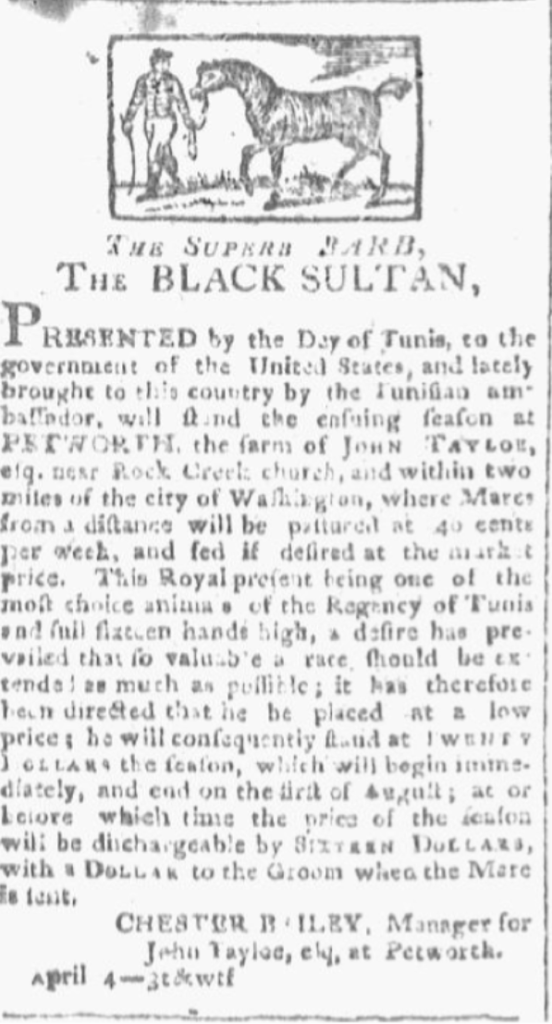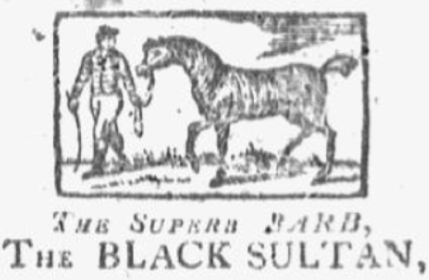The recent lawsuits Citizens for Responsibility and Ethics in Washington v. Trump and D.C. and Maryland v. Trump have raised a number of important historical questions relating to the Foreign Emoluments Clause of the U.S. Constitution (see editor’s note below). According to legal scholars Seth Barrett Tillman and Josh Blackman, the founding generation believed that Article I, Section 9, clause 8 – the Foreign Emoluments Clause – did not apply to the President. As part of their evidence for this interpretation, they point to times when President Thomas Jefferson accepted gifts from foreign powers, including the Mandan Indians and Tsarist Russia.[1] Jefferson’s acceptance of these gifts, they argue, demonstrates that either Jefferson believed that the president did not hold an “Office of Profit or Trust” under the United States or that he wantonly violated the Constitution at will.
By choosing Jefferson as their example, Tillman and Blackman’s interesting observation echoes James Parton’s 1874 adage “If Jefferson was wrong, America is wrong. If America is right, Jefferson was right.”[2] Since Jefferson likely understood what was required of him under the Constitution, his acceptance of foreign gifts in these cases supports the idea that Jefferson did not believe that the President was bound by the Constitution’s prohibition on persons holding offices under the United States accepting “any present, Emolument, Office, or Title, of any kind whatever, from any King, Prince, or foreign State.”
Their arguments in this matter raise important historical questions. Under what circumstances did President Jefferson accept these foreign gifts? Under what circumstances did he reject other foreign gifts? Although Jefferson is among the most studied figures in American history, there is little analytical work on his administration’s policy regarding gifts, whether foreign or domestic. When historians have published on some of the items given to Jefferson, such as Jeffrey Pasley’s treatment of the “Mammoth Cheese,” it is to comment upon the nature of American politics.[3] The cheese’s real significance was for what it heralded for the creation of participatory democracy after the Revolution of 1800. Largely absent from the historical literature on Jefferson’s presidency were the legal and Constitutional restrictions that Jefferson himself thought bound the president.
Throughout his administration, everyone from regular U.S. citizens to the representatives of foreign governments asked Jefferson to accept gifts, ranging from seeds to Arabian stallions. On these matters, Jefferson explained his views in an 1805 letter: “The inviolable rule which I have laid down for myself never while in a public character to accept presents which bear a pecuniary value.”[4] But, he went on,
it is not easy to draw the line between the admissible offers of a book by its author, of a curiosity &c &c and things of more sensible value. Dean Swift has somewhere said that a present, not to weigh on a liberal mind, should be of something of small cost, & yet not to be had for money.
What the third president laid out was a relatively simple proposition. The executive could readily accept gifts with no real monetary value. He believed that the Constitutional restrictions on presents given by foreign governments only applied to things that had a discernible monetary value.
The Bey of Tunis’s gift of an Arabian stallion provides an example of the circumstances that would lead Jefferson to reject a foreign gift. On Saturday, December 14, 1805, Tunisian Ambassador Sulayman Melmelli paraded four horses from Stelle’s Hotel to the President’s House. Among these horses was a sixteen-hand tall Arabian stallion – soon to be given the name Black Sultan. According to New Hampshire Senator William Plumer, the stallion was a “handsome” animal while the other horses were more ordinary.[5] Black Sultan was easily one of the most valuable gifts that Jefferson received during his presidency. Although I have not been able to find any sale records, the animal’s value must have been substantial as its future owners charged potential customers a stud fee of $25 for visiting mares.[6]

(Courtesy of Readex Early American Newspapers)
The equestrian in Jefferson, who dutifully noted in his Farm Book each foaling at Monticello, likely marveled at Black Sultan. Nevertheless, he did not accept this personal gift from the Bey of Tunis. During the winter of 1805-1806, the horse remained in the stables at the President’s House until District of Columbia resident John Tayloe agreed to pasture the animal at his farm. After almost a year in federal ownership, the government sold Black Sultan at auction to South Carolina Congressman Elias Earle. Earle soon shipped the horse to his plantation where he put him out to stud. By the early twentieth century, the Bey of Tunis’ gift had left an indelible mark upon the genetic character of American racehorses.[7]
Why did Jefferson reject the Arabian stallion? A considerable paper trail sheds light on the Constitutional considerations that were at the forefront of his thinking. In a conversation with Plumer, Jefferson told the senator that the Constitution prohibited him from accepting any gift from a foreign state without first obtaining the consent of Congress. In order not to upset Melmelli, and thereby precipitate an international incident, Jefferson believed that the government ought to accept the horses and then sell them at public auction in order to defray the cost of the ambassador’s visit (which the American people were responsible for paying).[8] A few days after speaking with Jefferson, Plumer conversed with Navy Secretary Robert Smith, who told the senator “the Government were much embarrassed respecting the presents that accompanied him from the Bey & were designed for the President.”[9]
Jefferson, ever true to form with a watchful eye on the public purse, insisted that the government properly account for the horse until they sold it at auction. In early February 1806, one Joseph Bryan received permission from the president “to put a couple of mares to the Barbary horse” as long as he agreed to pay the federal government whatever the market rate for studding turned out to be.[10] The next month, John Tayloe took temporary possession of Black Sultan and advertised stud services for $20 until the government sold the horse. Public interest in acquiring Black Sultan was high enough that Attorney General John Breckinridge inquired of James Madison how the administration planned to dispose of him.[11] Kentuckians had “such a rage for raising fine Horses in this Country” that he thought the public could get the highest price if they sold Black Sultan at auction in Lexington. Madison replied that the government would instead sell the horse in the fall when the gentry flocked to the city for the “race fields.”[12] The highest bidder was apparently Congressman Elias Earle, who soon began a brisk business farming out the stallion in his home state.[13] Jefferson the equestrian likely understood that Black Sultan would command a high price when brought to market and, as indicated by Plumer’s recollection of their conversation, declined to ask Congress for a waiver. Instead, he ordered Black Sultan sold for the benefit of the government’s coffers.
Why did Jefferson reject Black Sultan when he accepted a Bust of Alexander I from the Russian Tsar and items from the Mandan Indians? As evidenced by his conversation with Plumer in December 1805, he certainly thought that the Constitution prevented the President from accepting certain gifts from foreign governments. What, then, marked the difference between an Arabian stallion and a bust and native trinkets? The answer, according to Jefferson in the 1805 letter cited above, came down to an item’s monetary value. In order for something to be a foreign gift prohibited by the Constitution, Jefferson believed that it had to have an easily recognizable value in dollars and cents. Black Sultan fit that bill in an agrarian, horseracing, American culture. In this case, he acted accordingly to what he believed were his Constitutional duties. The bust and the Indian presents, conversely, were likely “admissible offers” that fit into the category of “curiosity &c.” While the Constitution made no written exceptions to the prohibition on accepting “any present,” Jefferson’s practice made just such a distinction.
[1] For their arguments see, Josh Blackman and Seth Barrett Tillman, “The Emoluments Clauses litigation, part 2 – the practices of the early presidents, the first Congress and Alexander Hamilton,” The Washington Post: Volokh Conspiracy September 26, 2017 https://www.washingtonpost.com/news/volokh-conspiracy/wp/2017/09/26/the-emoluments-clauses-litigation-part-2-the-practices-of-the-early-presidents-the-first-congress-and-alexander-hamilton/?utm_term=.4dbd6d6af8c0 [accessed May 24, 2018]; Seth Barrett Tillman, Motion for Leave of Amici Curiae Scholar Seth Barrett Tillman and the Judicial Education Project to Be Heard at Oral Argument (May 15, 2018). Senator Richard Blumenthal v. Donald J. Trump, in his official capacity as President of the United States of America, Civ. A. No. 1:17-cv-01154-EGS (D.D.C. May 21, 2018) (Sullivan, J.), Dkt. No. 52. Available at SSRN: https://ssrn.com/abstract=3177824.
Editor’s note [added January 17, 2019]: Professor Seth Barret Tillman has objected that the sentence “According to legal scholars Seth Barrett Tillman and Josh Blackman, the founding generation believed that Article I, Section 9, clause 8 – the Foreign Emoluments Clause – did not apply to the President.” is inaccurate. He believes an accurate version is: “Tillman believed the dominant view in the founding generation was that the Foreign Emoluments Clause and its operative office…under the United States language did not encompass the presidency.” The Docket believes that the difference between these two sentences is extremely slight. However, because Professor Tillman has in good faith offered a lengthy explanation of his position, we believe he deserves to have his view of this matter known. We apologize for any confusion and to Professor Tillman if we have mischaracterized his position.
[2] James Parton, Life of Thomas Jefferson. Third President of the United States (Boston: James R. Osgood and Co., 1874), iii; on the continuing importance of Jefferson as a symbol to Americans see, Jan Ellen Lewis, “American Synecdoche: Thomas Jefferson as Image, Icon, Character, Self,” in The Mind of Thomas Jefferson, ed. Peter S. Onuf (Charlottesville: University of Virginia Press, 2007), 50-64; Francis D. Cogliano, Thomas Jefferson: Reputation and Legacy (Charlottesville: University of Virginia Press, 2008).
[3] Jeffrey Pasley, “The Cheese and the Words: Popular Political Culture and Participatory Democracy in the Early American Republic,” in Beyond the Founders: New Approaches to the Political History of the Early American Republic, edited by Jeffrey L. Pasley, Andrew W. Robertson, and David Waldstreicher (Chapel Hill: University of North Carolina Press, 2004), 31-56.
[4] Thomas Jefferson to Phillippe Reibelt, October 12, 1805, Library of Congress, Jefferson Papers.
[5] Soliman Melimeni to James Madison, December 13, 1805, The Papers of James Madison: Secretary of State Series 11 vols. to date (Charlottesville: University of Virginia Press, 1986-), 10:658; Everett Somerville Brown, William Plumer’s Memorandum of Proceedings in the United States Senate, 1803-1807 (New York: MacMillan, 1923), 351; National Intelligencer, April 9, 1806. For an excellent overview of Melmelli’s diplomatic mission to the United States see, Jason Zeledon, “As Proud as Lucifer”: A Tunisian Diplomat in Thomas Jefferson’s America,” Diplomatic History 41 (2017): 155-82.
[6] Augusta Chronicle (Georgia), March 28, 1807; Carolina Gazette (Charleston), March 2, 1810.
[7] The Register of the American Saddle Horse Breeders’ Association, volume 4, (Louisville, Ky, 1911), xviii.
[8] Brown, William Plumer’s Memorandum of Proceedings in the U.S. Senate, 334.
[9] Brown, William Plumer’s Memorandum of Proceedings in the U.S. Senate, 344
[10] Joseph Bryan to James Madison, February 3, 1806, PJM: Sec. of State Ser., 11:268.
[11] John Breckinridge to James Madison, May 24, 1806, PJM: Sec. of State Ser., 11:611-13.
[12] Madison to Breckinridge, June 15, 1806, Library of Congress, Madison Papers.
[13] George H. Conn, The Arabian Horse in America (Woodstock, VT: The Countryman Press, 1957), 72.
Editor’s Note [updated, January 17, 2019]: In addition to Blackman and Tillman’s works cited in footnote one, Tillman has published numerous pieces explaining his argument, such as “The Foreign Emoluments Clause–Where the Bodies Are Buried,” 59 South Texas Law Review 237 (2017). Many of Tillman’s other major pieces may be found here. A previously published version of this article included a link to an amicus brief by Gautham Rao, Jed Shugerman, John Mikhail, Simon Stern and Jack Rakove, which was filed in the case Citizens for Responsibility and Ethics in Washington v. Trump, Civil Action No. 1:17-cv-00458-GBD in the Southern District of New York. Professor Tillman has brought to our attention that we posted this link without posting a link to a letter by Daniel J. Walker to Judge George B. Daniels on October 3, 2017, in which Rao, Shugerman, Mikhail, Stern and Rakove withdrew footnote 82 of that brief. That letter may be found here. Rao et al. also apologized for this footnote to Professor Tillman on a blog post dated October 3, 2017, which is available here.



